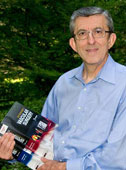How to Edit a 19 Pound Surgical Textbook
Tips from Wayne Johnston
The 7th edition of Rutherford's Vascular Surgery arrived
in bookstores this spring. Weighing in at 19 pounds, this
textbook is the reference standard in the field, comprising
2500 pages in 2 volumes.
Because of the revolution in the practice of vascular surgery
over the past decade, much of the material presented
by editors Jack Cronenwett and Wayne Johnston is new.
Developing the table of contents was the greatest challenge
because of the advances that have occurred in intervention,
imaging and medical management. Since both editors have
served as editors-in-chief of the Journal of Vascular Surgery,
they were well-prepared to reorganize the text based on
their close knowledge of new developments in the field.
The publisher emphasized that younger readers (e.g.
residents) who have grown up in a world of sound bites
and tweets do not like long paragraphs. They prefer
boxes of key points and summaries to take away to the
examination. As a compromise with their more traditional
approach, Wayne and Jack used short segmented sections
with disciplined and orderly headings and subheadings.
There are abundant illustrations in color. Instead of traditional
medical illustrators, the excellent diagrams were
prepared through a company that employs freelance artists
under contract to the publisher. These artists often
derive their illustrations from the abundant supply of
Google images on the web. Many of them start out as
drawings from the original Gray's anatomy, now out of
copyright. Illustrators can then Photoshop these drawings
to give them a contemporary and more uniform
look. Permission to copy drawings or to adapt them is
readily available in the current era. Copyright clearance
is obtained by online permission, usually without cost.
Illustrators credit the source as "redrawn from..."
The editors were astounded that the distinguished vascular
surgeon Robert Rutherford had been able to produce
the first six editions of the text book single-handedly over
the past 30 years. The advances in imaging, interventional
radiology and minimal access techniques required
radical
|
changes to record the revolution that has occurred
in the specialty. The editors lowered the average age of
the authors by about a generation. In addition, they
set strict rules. In order
to allow mid-career surgeons
to participate as authors, they disqualified
themselves on the
basis of age from writing
any chapter. This eased
the task of excluding
other senior scholars in
the field. A second strict
rule was that no author
could write more than
one chapter. Thus each
of the 161 chapters has
a different senior author.
Authors were provided with templates and examples of
outlines. The editors and the eight associate editors gave
critical appraisals of the outlines submitted by the authors
in order to reduce overlap between chapters and ensure
that the topic was completely covered.

Wayne Johnston
|
Authors were carefully chosen, emphasizing inclusiveness,
openness, activity within the society, and wide
geographic distribution. Access to the reviewer and
author database of the Journal of Vascular Surgery was
very helpful in choosing authors since there were data on
their contributions. This gave insight into their expertise
and timeliness - indeed, the chapters came in on time.
All of the references are online, a significant reduction
from earlier editions that devoted up to 15% of the pages
to references. Instead with each chapter, there are a small
number of selected key references with annotations that
explain their significance.
This is one of the few textbooks sponsored by a society.
The contract to produce the book was signed by The
Society of Vascular Surgery with Elsevier. The society was
responsible for choosing the editors. The editors chose the
eight associate editors and authors. Purchasers of the book
get an activation number which gives them password
protected access to the electronic version of the text. They
then have access to additional updated references chosen
to guide them to advances in the field and 40 vascular videos
from the library of the American College of Surgeons.
This textbook brings honor to our Department, and
reflects the outstanding scholarship and organizational
skills of its editors. See also the article on
Wayne Johnston, Surgical Spotlight Summer 2009
M.M.
|